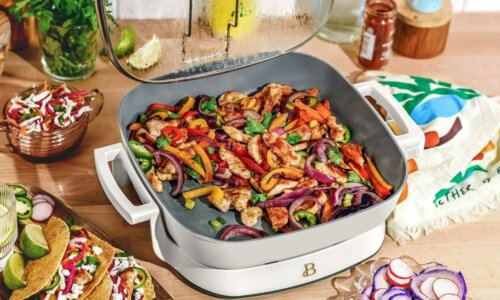Whole Foods is generally considered a mecca for those who love healthy food and organic options, but many disgruntled customers are saying that the grocery store chain has gone downhill ever since Amazon took over.
Most notably, Whole Foods shoppers are complaining that the store shelves are no longer properly stocked, and that many items are unavailable. And now, analysts from financial services firm Barclays are backing up those claims. The analysts visited Whole Foods stores and issued a report on their findings.
“The store had no bananas and the supply of eggs and Tropicana products was very low,” they wrote. “Entire displays, refrigerated cases, and end caps were completely empty. The prepared foods hot bar was entirely empty.”
Their findings bear out in many customers’ complaints on social media. Here’s a shot of a barren produce section from food policy writer Bettina Elias Siegel:
Near-empty @WholeFoods produce sections, like mine here in Houston (photo below), are now apparently commonplace nationwide: https://t.co/zCIZjJ18Nq (h/t @tangerineink) pic.twitter.com/iHC2i0xg9a
— Bettina Elias Siegel (@Bettina_Siegel) January 10, 2018
And here’s a photo a sad, empty Whole Foods hot bar:
https://twitter.com/texrex96/status/947617788822282240
In addition to their analysis of the inventory, Barcalys analysts found that the quality of Whole Foods’ produce also appears to have deteriorated.
“It is possible this is weather-related but our observations also coincide with several reports that customers felt quality of produce had started to deteriorate,” analysts said.
Indeed, dissatisfied customers have taken to social media to complain about sub-par produce:
@WholeFoods purchased a 3lb bag on Honeycrisp apples on 1/6/18.. not what I expected to find. #howdoilikethemapples#wholefoods#produce#yourebetterthanthat pic.twitter.com/3rLzPKaLuf
— Jescilee (@jescilees) January 11, 2018
Whole Foods complaints about produce quality since Amazon deal – Business Insider https://t.co/dFvEh1xMvL
— Tierra Partners (@tierrapartners) January 9, 2018
And there have been complaints that Whole Foods is not keeping up its strong partnerships with local companies, and that small businesses are being squeezed off the shelves:
Update: According to @washingtonpost Whole Foods has begun requiring food producers to pay for in-store demo opportunities, and require some producers to discount their products sold in Whole Foods stores https://t.co/2QTYqL1c8K
— Civil Eats (@CivilEats) January 8, 2018
This could be because Whole Foods has instituted new rules for suppliers—rules that are meant to lower costs, but could, in turn, be keeping local vendors from getting a foot in the door. Vendors will also have less control over their displays and inventory choices, as they will have to hand the majority of the decision-making over to Daymon, a retail strategy firm that Whole Foods has retained.
Ultimately, many long-time customers aren’t happy with Whole Foods right now, and many people say that Amazon and its CEO, Jeff Bezos, are to blame.
https://twitter.com/THEHCC/status/951513340085440513
Let’s hope these are just growing pains and that we will see a return of the high quality Whole Foods has been known for—or at least that they start putting some food back on the shelves!







